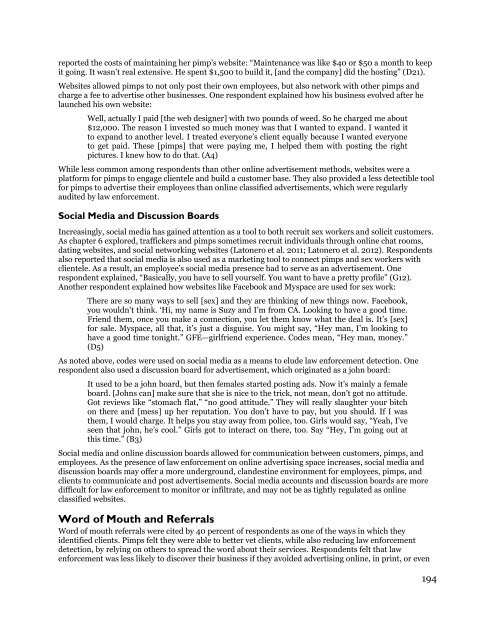413047-Underground-Commercial-Sex-Economy
413047-Underground-Commercial-Sex-Economy
413047-Underground-Commercial-Sex-Economy
You also want an ePaper? Increase the reach of your titles
YUMPU automatically turns print PDFs into web optimized ePapers that Google loves.
eported the costs of maintaining her pimp’s website: “Maintenance was like $40 or $50 a month to keep<br />
it going. It wasn’t real extensive. He spent $1,500 to build it, [and the company] did the hosting” (D21).<br />
Websites allowed pimps to not only post their own employees, but also network with other pimps and<br />
charge a fee to advertise other businesses. One respondent explained how his business evolved after he<br />
launched his own website:<br />
Well, actually I paid [the web designer] with two pounds of weed. So he charged me about<br />
$12,000. The reason I invested so much money was that I wanted to expand. I wanted it<br />
to expand to another level. I treated everyone’s client equally because I wanted everyone<br />
to get paid. These [pimps] that were paying me, I helped them with posting the right<br />
pictures. I knew how to do that. (A4)<br />
While less common among respondents than other online advertisement methods, websites were a<br />
platform for pimps to engage clientele and build a customer base. They also provided a less detectible tool<br />
for pimps to advertise their employees than online classified advertisements, which were regularly<br />
audited by law enforcement.<br />
Social Media and Discussion Boards<br />
Increasingly, social media has gained attention as a tool to both recruit sex workers and solicit customers.<br />
As chapter 6 explored, traffickers and pimps sometimes recruit individuals through online chat rooms,<br />
dating websites, and social networking websites (Latonero et al. 2011; Latonero et al. 2012). Respondents<br />
also reported that social media is also used as a marketing tool to connect pimps and sex workers with<br />
clientele. As a result, an employee’s social media presence had to serve as an advertisement. One<br />
respondent explained, “Basically, you have to sell yourself. You want to have a pretty profile” (G12).<br />
Another respondent explained how websites like Facebook and Myspace are used for sex work:<br />
There are so many ways to sell [sex] and they are thinking of new things now. Facebook,<br />
you wouldn’t think. ‘Hi, my name is Suzy and I’m from CA. Looking to have a good time.<br />
Friend them, once you make a connection, you let them know what the deal is. It’s [sex]<br />
for sale. Myspace, all that, it’s just a disguise. You might say, “Hey man, I’m looking to<br />
have a good time tonight.” GFE—girlfriend experience. Codes mean, “Hey man, money.”<br />
(D5)<br />
As noted above, codes were used on social media as a means to elude law enforcement detection. One<br />
respondent also used a discussion board for advertisement, which originated as a john board:<br />
It used to be a john board, but then females started posting ads. Now it’s mainly a female<br />
board. [Johns can] make sure that she is nice to the trick, not mean, don’t got no attitude.<br />
Got reviews like “stomach flat,” “no good attitude.” They will really slaughter your bitch<br />
on there and [mess] up her reputation. You don’t have to pay, but you should. If I was<br />
them, I would charge. It helps you stay away from police, too. Girls would say, “Yeah, I’ve<br />
seen that john, he’s cool.” Girls got to interact on there, too. Say “Hey, I’m going out at<br />
this time.” (B3)<br />
Social media and online discussion boards allowed for communication between customers, pimps, and<br />
employees. As the presence of law enforcement on online advertising space increases, social media and<br />
discussion boards may offer a more underground, clandestine environment for employees, pimps, and<br />
clients to communicate and post advertisements. Social media accounts and discussion boards are more<br />
difficult for law enforcement to monitor or infiltrate, and may not be as tightly regulated as online<br />
classified websites.<br />
Word of Mouth and Referrals<br />
Word of mouth referrals were cited by 40 percent of respondents as one of the ways in which they<br />
identified clients. Pimps felt they were able to better vet clients, while also reducing law enforcement<br />
detection, by relying on others to spread the word about their services. Respondents felt that law<br />
enforcement was less likely to discover their business if they avoided advertising online, in print, or even<br />
194


